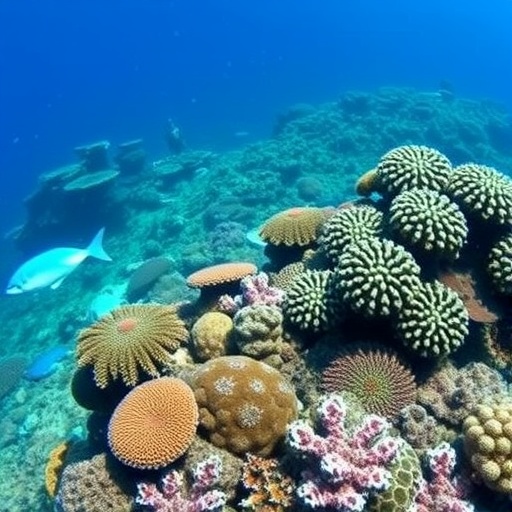As climate change continues to unfold with alarming rapidity, its impacts resonate across the globe, leaving no ecosystem untouched. One of the most devastated environments is underwater ecosystems, particularly coral reefs. According to recently published research by Zeng, He, and Zhan, the inexorable decline of coral reefs due to climate change-induced thermal stresses makes for stark reading. The paper, appearing in Commun Earth Environ, elucidates the dire consequences of global warming on these vital marine habitats and emphasizes the urgency of addressing climate change to mitigate further loss.
Coral reefs are often deemed the “rainforests of the sea,” showcasing high biodiversity while serving as essential ecosystems for myriad marine organisms. They provide more than just breathtaking beauty; they contribute to coastal protection, support fisheries, and engage in crucial carbon cycling processes. The alarming decline of coral reefs poses considerable risks not only to marine life but also to human communities that rely on these ecosystems for livelihoods and protection against natural disasters.
Central to the findings of Zeng and colleagues is the pressing issue of ocean temperature rise, driven primarily by greenhouse gas emissions. As global temperatures surge, marine heatwaves are becoming more frequent and severe. These heatwaves inflict detrimental damage to coral cells, leading to widespread coral bleaching. The fragile symbiotic relationship between coral polyps and their algal symbionts, known as zooxanthellae, is disrupted under heat stress, resulting in a loss of color and vitality. When subjected to increasing temperatures, corals can expel these vital algae, leading to a stark decline in their energy reserves and, ultimately, their survival.
The research underscores that even minor fluctuations in sea surface temperatures can have catastrophic effects. Coral reefs thrive in narrow temperature ranges, and slight deviations can trigger physiological stress responses. Rising sea temperatures not only directly impact coral health but also exacerbate the prevalence of diseases and aggressive macroalgae that threaten coral dominance. The research stresses that without immediate action to address climate change, coral reefs face inevitable collapse during this century.
Another critical aspect highlighted in this study is the role of ocean acidification, another byproduct of climate change. The increased absorption of carbon dioxide (CO2) by oceans leads to decreased pH levels, creating a more acidic environment. This shift affects the ability of corals to calcify, a process vital for their growth and structural integrity. The impending decline in calcification rates poses a double threat, accentuating coral vulnerability to hostile conditions while further diminishing their ecosystem services.
Additionally, the research delves into the socioeconomic implications of this decline. Coastal communities globally depend on coral reefs for food security, tourism, and cultural identity. Following a decline in coral health, there are cascading effects on fisheries, which may lead to food shortages and increased poverty. The interdependence between coral health and human welfare highlights that addressing climate change is not only an environmental issue but also an ethical one, requiring a collective global response.
Implementing effective conservation strategies is imperative to avert this impending crisis. The researchers propose several avenues, including enhancing marine protected areas (MPAs) to shield corals from additional human-induced stressors. Effective management of overfishing and nutrient runoff, alongside restoration efforts for degraded reefs, has the potential to bolster coral resilience against climate change’s harsh realities.
However, these measures can only mitigate the impacts but not halt the progression of coral decline without substantial and prompt reductions in global greenhouse gas emissions. International co-operation and adherence to agreements like the Paris Accord must be prioritized to achieve climate stability. Moreover, raising public awareness and promoting sustainable practices can empower communities to become active participants in local efforts to protect their marine environments.
The researchers also stress the importance of advancing scientific understanding of coral adaptation and resilience mechanisms. Employing genetic approaches and assisted evolution techniques could fine-tune coral species capable of thriving in warmer waters. Such innovative conservation techniques could potentially offer hope amidst a glum outlook for marine biodiversity.
With continued vigilance and commitment, there remains a flicker of hope for coral ecosystems. Every action counts, and while profound changes are needed at the governmental and corporate levels, individual contributions can initiate a ripple effect of positive change. Responsible consumer choices, reducing carbon footprints, and advocating for marine conservation initiatives can collectively help conserve the world’s coral reefs.
In conclusion, the decline of coral reefs under climate change-induced thermal stresses is not just an environmental issue; it is a profound global challenge that intertwines ecological integrity with human survival. The research by Zeng, He, and Zhan serves as a clarion call to take action now to protect one of Earth’s most vital ecosystems. Failure to do so will not only result in a loss of biodiversity but also in upheaval of economies and communities that depend on these natural wonders, magnifying the interconnectedness of climate health and human well-being.
The message resonates clear: the time for action is now. The sustainability of our planet’s future, its ecosystems, and, by extension, human civilization, hangs in the balance, urging all of humanity to unite in the fight against climate change.
Subject of Research: Coral reef decline due to climate change-induced thermal stresses.
Article Title: Inevitable global coral reef decline under climate change-induced thermal stresses.
Article References:
Zeng, K., He, S. & Zhan, P. Inevitable global coral reef decline under climate change-induced thermal stresses.
Commun Earth Environ 6, 827 (2025). https://doi.org/10.1038/s43247-025-02790-4
Image Credits: AI Generated
DOI: 10.1038/s43247-025-02790-4
Keywords: Coral reefs, climate change, thermal stress, ocean acidification, biodiversity loss, marine ecosystems, greenhouse gas emissions, marine protected areas.




